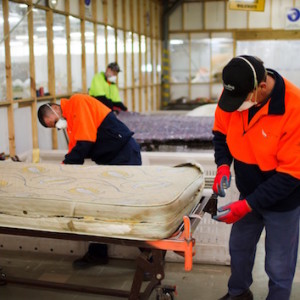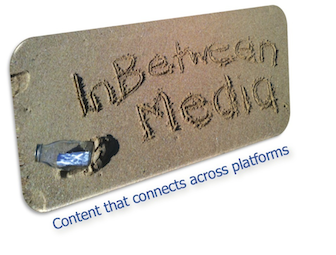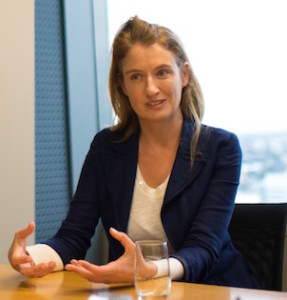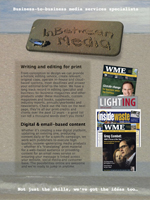In recent years, the principles and practices of social sustainability have developed a greater presence in the business landscape. However, effective partnerships enabling positive social impact have a long and meaningful history in Australia.
The cornerstone of shared value creation is in collaboration and strategic partnerships. Organisers of the Purpose event, taking place next week in Sydney, believe we need to “combine and conquer” in order to develop purpose driven business.
Speaking at a session on this topic on 6 December, Sarah Chisholm will bring more than 20 years’ of experience to the discussion, including some truly innovative projects offering benefits to newly arrived refugees, people experiencing barriers to work, and artists.
Ms Chisholm manages strategy and communications for Resource Recovery Australia (RRA), a social enterprise of Community Resources Inc, a not-for-profit community development organisation established in 1987 in Forster NSW. Community Resources operate four social enterprises (RRA, Soft Landing, Wastewell and Helping Hands), two community service arms and a range of community initiatives including international development initiatives.

End-of-life mattresses are a growing problem in Australia. More than 1.6 million are disposed of each year to landfill taking up around one million cubic metres.
RRA recently acquired Soft Landing, a successful mattress recycling social enterprise established by Mission Australia, to further scale job creation through their #Waste2Wages agenda.
“I really enjoy collaboration and strategic partnership work,” said Ms Chisholm, “As a social enterprise [RRA] we are effectively running a business and a social service (components of)”.
“To achieve real influence and impact in our chosen field/sector, it has been my experience that targeted partnerships must be identified and invested in.
“Our most recent strategic partnership at RRA is with the UNSW Sustainable Materials Research and Technology (SMaRT) Centre. They have the equipment, skills and infrastructure to research and analyse end of life materials (waste).”
Ms Chisholm explained that it’s more effective to invest in this partnership than build this capacity internally, which would dilute RRA’s focus on day-to-day resource recovery operations and social support networks for its staff.
“RRA provide UNSW SMaRT with a trusted community partner with sites across Australia, which they love as it ensures their solutions deliver the greatest possible benefits on the ground and in communities,” said Ms Chisholm.
In another strategic partnership, earlier this year, Soft Landing developed a partnership with the TIC group, choosing collaboration over competition.
“TIC will be our technology suppliers in Sydney & Melbourne metro,” said Ms Chisholm, “Together we identified that in these locations the volume of mattresses needing to be recycled was too much for our manual deconstruction process alone”.
Through this partnership, TIC has introduced the latest automated technology from The Netherlands, and Soft Landing will co-locate with TIC in Sydney and Melbourne over 2017.
“This cross-sector partnership really explores new territory. We are working together to provide our clients the latest technology, as well as the highest ongoing environmental and social impact,” she said.
Soft Landing has also been working with mattress manufacturers, component suppliers, importers and retailers to develop a voluntary product stewardship scheme. This has now commenced and is seeking Government accreditation within the next three years.
Building communities takes time
Ms Chisholm is no newcomer to social enterprise, she previously co-founded Green Connect, which continues to grow and create employment for newly arrived refugees and young people in resource recovery and food production in the Illawarra.
She worked at Job Futures from 2010-2012, a peak body for not-for-profits working in employment services.
“As part of my role at Job Futures (now Co-Act) I was looking at what industries and projects were creating real work for people experiencing disadvantage,” said Ms Chisholm.
Resource Recovery stood out to her. It had been in operation for 21 years, successfully working in a regional labour market, growing each year by 10% and with a strong track record in creating training, employment and careers with Aboriginal community members experiencing disadvantage, in particular those leaving the prison system.
“At the time, the Westpac Foundation was interested in supporting the scale and growth of proven social enterprise models,” she said. Ms Chisholm worked with Resource Recovery on an application and business plan for replicating, transferring and scaling their model.
“This was successful and I became the Founding Manager of what is now Resource Recovery Australia, building a team to share and replicate the learnings and model from Forster, nationally.”
In its first year alongside RRA, Soft Landing has grown from two sites (Bellambi and Smithfield in NSW) to five sites across three states opening in Hume (ACT), Wanneroo (Perth) and most recently Newcastle (NSW).
“We have doubled our impact and expect continued growth,” said Ms Chisholm.
She said that when RRA and Soft Landing open a new site in a new region, they have been able to establish “great partnerships with local organisations similar to Community Resources to provide the best local wrap around services to our staff and to commence engagement with the activities and networks of the local community”.
“While cheaper operators compete against us, our customers are increasingly looking for sustainability and value long term – sustainability of the business itself (some recycling operators come and go) and our commitment to the best environmental outcomes.
“Increasingly, our social impact is also being recognised by our customers including their adoption of social procurement policies,” said Ms Chisholm.
As of 30 June 2016 Community Resources employs 267 staff, 25% of staff are Aboriginal. Annual turnover is $14 million.
* You can learn more about partnerships and collaboration for sustainability at PURPOSE being held in Sydney December 5-6 http://purpose.do/program/ – and hear more from Sarah Chisholm including her next venture Money Laundering, an experimental business incubator looking into the feasibility of an operational artist run laundromat.



Comments are closed.